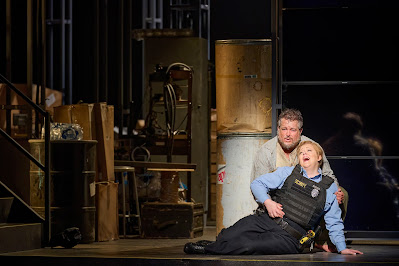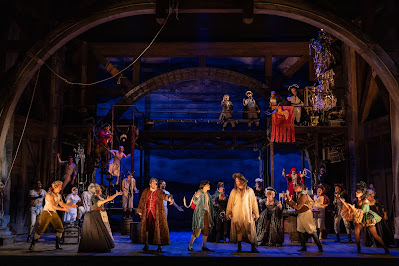Reviewed by James Karas
The Metropolitan Opera has started this year’s live transmissions to theatres around the world with Dead Man Walking. It is an opera by Jake Heggie to a libretto by Terrence MacNally and the performance was so powerful I will use a string of superlatives to do it some justice. It is a stunning, emotionally draining and simply great opera that grabs you by the throat in the first minutes and does not release you until the final blackout. It is thrilling.
Dead Man Walking premiered in San Francisco in 2000 and has been produced some 75 times around the world but the fabled Met only got around to producing it this year. With Yannick Nezet-Seguin on the podium, Ivo van Hove as director and a brilliant cast, the production deserves to be described as a masterpiece.
The opera follows the experience of a nun, Sister Helen (Joyce di Donato), who befriends Joseph De Rocher (Ryan McKinny) a convict on death row in the Louisiana State Penitentiary, Angola. She provides him or wants to provide him with spiritual comfort as he awaits his execution amid hopes of a reprieve or a commutation of his sentence. She wants him to tell her the truth, accept responsibility for his actions and seek forgiveness. He is adamant that he did not commit the murder but that it was done by his brother. She is desperately seeking for Joe’s redemption but he can only find it by facing up to the truth.
 |
There is a heart-wrenching hearing before the Parole Board where De Rocher’s mother (Susan Graham) makes an impassioned and searing plea for clemency to the board. The parents of the two murdered teenagers are there also and their pain and loss leave no room for forgiveness. It is an unforgettable scene.
Ivo van Hove gives the opera a masterly production that deserves the title of work of a genius. He makes liberal use of video projections by Projection Designer Christopher Ash that give clarity and meaning to the production. The performance opens with a video showing a forested area and zeros in on a young couple taking a swim in a lake and then being confronted by two men. The girl is brutally raped and both are killed. It is a harrowing scene.
Projected videos are used throughout the performance to excellent effect giving additional punch to the scenes that we are witnessing. Brilliant.
The vocal and acting performance are of a stature that I have never seen in an opera and rarely in the theatre. Mezzo-soprano Joyce DiDonato who has sung the gamut of opera roles, gives a performance that may well be considered the pinnacle of her long career. The role of Sister Helen makes huge vocal demands as she tries to get to De Rocher’s soul but the emotional stresses as she faces De Rocher’s mother, the parents of the victims and finally the harrowing execution are almost unbearable.
Bass-baritone Ryan McKinny is outstanding as Joseph De Rocher. He is a muscle-bound man who displays bravura in his attempts to deny his guilt and hide his fear. But his fear is palpable and Sister Helen eventually breaks through his defences and reveals his fear and humanity. McKinny gives the angry, frightened and human De Rocher a superb voice as Sister Helen breaks through the convict’s outward denials and gets to his heart and hopes he finds redemption.
Susan Graham delivers a monumental performance as De Rocher’s mother. She plays a poor and uneducated woman who loves her son. She gives a towering vocal performance that reaches heart-breaking emotional depths as she tries to save her boy from execution. Seeing her in the movie theatre screen in closeups is an advantage over what people who see it live in the huge Met Opera house at Lincoln Centre. I cannot praise her towering performance enough.
The set and lighting by designer Jan Versweyveld are minimalist. The set for the school where we meet Sister Helen and the other nuns is simply a large room. The same set is used for the prison scenes with different lighting. A large table is brought in for the Parole Board meeting. There are no prison bars or cells. All is sparse but extremely effective.
Yannick Nezet-Seguin conducts the mighty Met Opera Orchestra in a score that carries you through from the first bar to the final note. You may never have heard it before but it is music that is alive and varies as the situation demands and is major part of the great performance.
_____________________
Dead Man Walking by Jake Heggie (music) and Terrence McNally (libretto) was shown Live in HD from the Metropolitan Opera on October 21, 2023 at various Cineplex theatres. For more information: www.cineplex.com/events
James Karas is the Senior Editor, Culture of The Greek Press



















